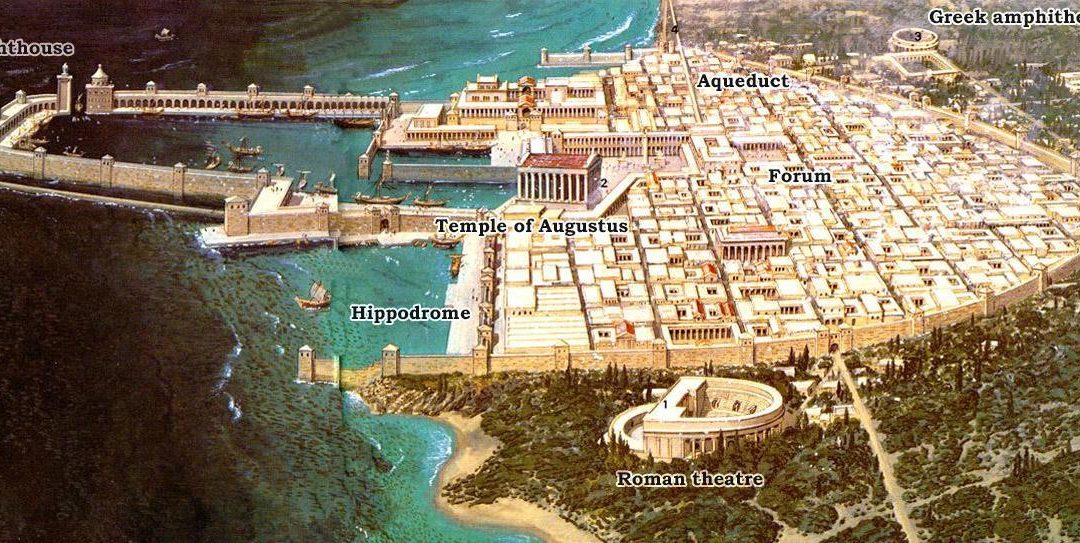Pay attention to the vital few. . .. John Paul DeJoria, American entrepreneur
At Festus’ command, Paul was brought in. The Acts of the Apostles 25:23
The Setting, Acts 24
It is a massive complex on the Mediterranean coast, completed in 9 B.C. Caesarea Maritima : a city of roads, large public buildings, baths, sewage and water systems, storerooms, markets, and hundreds of giant marble and limestone pillars lining streets and the huge pagan temple. There is a ten mile long aqueduct, the theater with seating for 4,000, and a hippodrome for chariot races—all due to the tyrannical, murderous, architectural genius of Herod the Great. His lavish palace has been built on a promontory extending into the sea. Also extending into the sea is an enormous artificial harbor built with a highly sophisticated system of hydraulic concrete—an engineering marvel. Six giant statues and a lighthouse welcome ships from around the known world.
Harassed, in Custody
Three years after the Paul’s conversion, a plot by Greek-speaking Jews had his friends rushing him away from Jerusalem to Caesarea. There, he had boarded a ship in that ingenious harbor for his hometown of Tarsus.
Now, years later, another threat has returned him to this Roman legislative headquarters. Paul has already appeared before Antonius Felix, the cruel, incompetent governor of Judea. His wife, Drusilla, is sister to the king of this part of Judea, Herod Agrippa II. It’s fairly well known that the king is in an incestuous relationship with another sister, Bernice.Their father, by the way, Herod Agrippa I, killed the Apostle James with the sword, Christianity’s first martyr. Then he died a humiliating death there in the theater in Caesarea Maritima (Acts 12).
When it became clear that Paul would not participate in bribes, Felix simply kept him under arrest for two years.
However, Felix has now been succeeded by Festus, a, shall we say, more balanced governor who wants to clear up old cases. Paul intrigues him. The charges against this educated, articulate Jewish citizen of Rome are muddy. But the prisoner has appealed to Caesar and, in Festus’ words, “to Caesar you shall go.”
In a lucky coincidence, King Herod Agrippa II and Bernice will be arriving soon to greet the new governor.
The Puzzling Case, Acts 25
A few days after their arrival, Festus mentions Paul’s case. The Herods were Jews, and Festus takes the opportunity to describe this thorny case to Agrippa:
- the Roman citizen left in prison by Felix
- the perplexing approach of his accusers—Jewish religious authorities
- and the Jesus person.
Agrippa would be an expert in all matters of Jewish law. It’s perfect. The case will be heard the next day.
The Venue and the Pomp, Acts 26
It will take place in a legislative hall where legal issues are given a hearing. Mosaic floors? A pillared ceiling? Wall murals? Marble statues? Probably. “Pomp” is the term used to describe the entry of the entourage. Herod Agrippa II and Bernice are accompanied by five Roman Tribunes, commanders of 500-man battalions. There are influential men of the city. And, of course, aides, royal attendants, court reporters, security. On display in that great hall are power, wealth, and military might.
Present also, unobtrusively taking notes, is the physician, Luke, Paul’s faithful companion over much of the past two years.
The Real Cosmic Adversaries
Once everyone is present, at Festus’ command, the Apostle Paul is brought in. (My mind fixates on this scene as I meditate on these chapters.) Before Agrippa invites Paul to speak, before he utters a word, there is in that enormous room, face to face, a microcosm:
The might of the Gospel versus both the rigid power of the Law, and an entrenched pagan world view.
Paul stands before them in chains. They, with their sordid, violent histories, do not recognize the Apostle, the man of power with God. His testimony is searingly honest, beautiful in expression. At the end, he addresses Agrippa directly, the vital one, with words that almost bring Festus out of his chair:
God has protected me right up to this present time so I can testify to everyone, from the least to the greatest. I teach nothing except what the prophets and Moses said would happen—that the Messiah would suffer and be the first to rise from the dead, and in this way announce God’s light to Jews and Gentiles alike.
“I am not out of my mind. And you, King Agrippa, as a Jewish man, with your knowledge of Jewish history and the Law, know these things to be true.”
“You press me hard,” the king replies.
“Ah,” says the great Apostle, “I wish you were as I am, except, of course, for the chains.”
““““““““““““““““““““““““
Some weeks ago I stood again in the ruins of Caesarea Maritima thinking about that scene two thousand years ago. Did anyone in the room come to Christ? We don’t know. But Paul had already written his letter to the church fellowship in Rome. And Caesar’s household had already been infiltrated by believers.
What we do have is this remarkable template for fearlessly, wisely, testifying to the truth of the death, burial, and resurrection of Jesus Christ. In years to come, terrible persecution would descend on the church. Christians would be slaughtered in the theater there in Caesarea Maritima. Still, the Gospel would move inexorably across the known world.
In a recent message*, my pastor said:
God often wants people to have an encounter with us before an encounter with Him.
Our responsibility is to be available, to be willing to enter into the work God is already doing
in the lives of people He brings into our sphere of influence.
Paul lived that. Convicted, humbled, inspired, I want to live it, too.
*at 44:50

